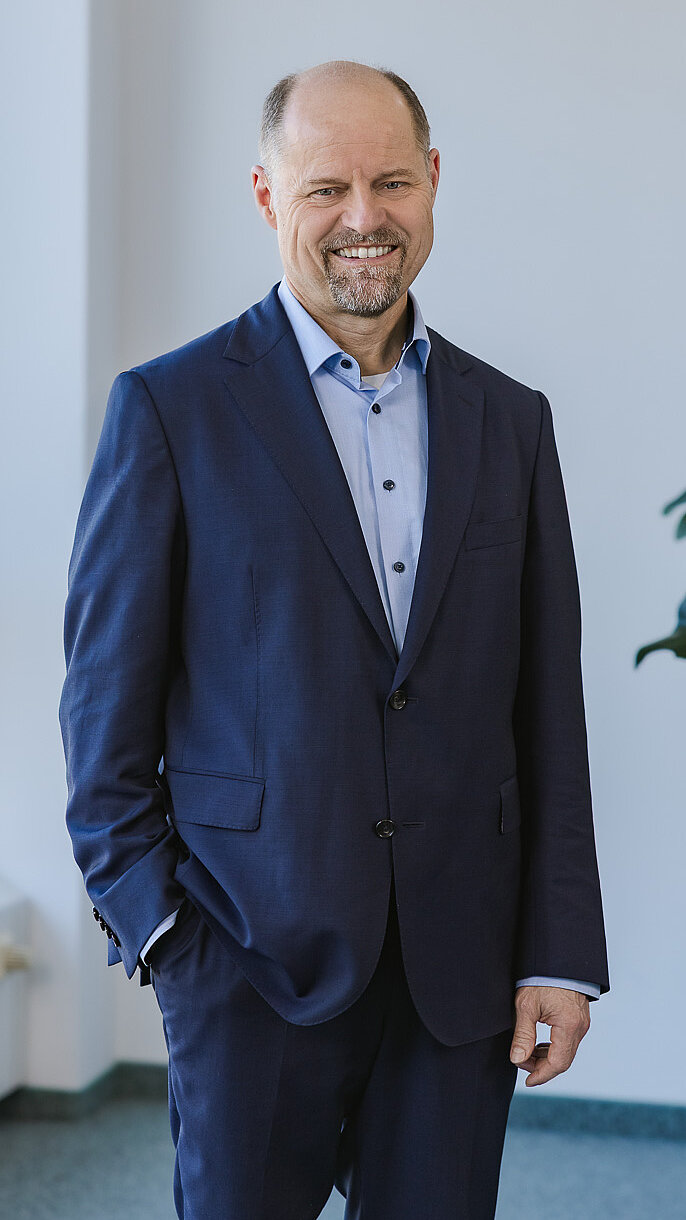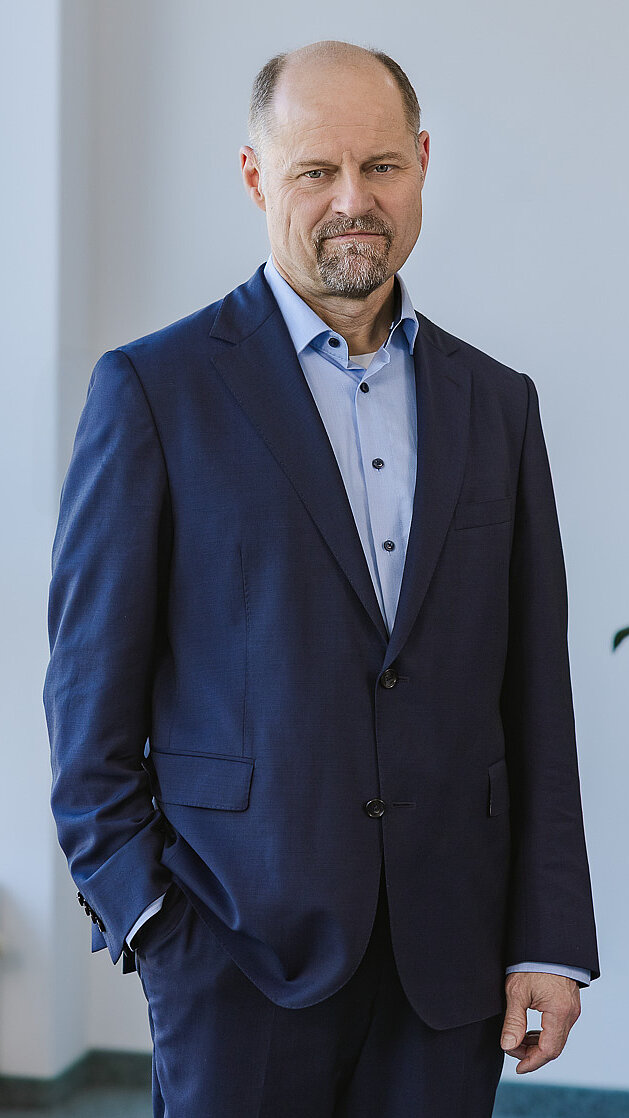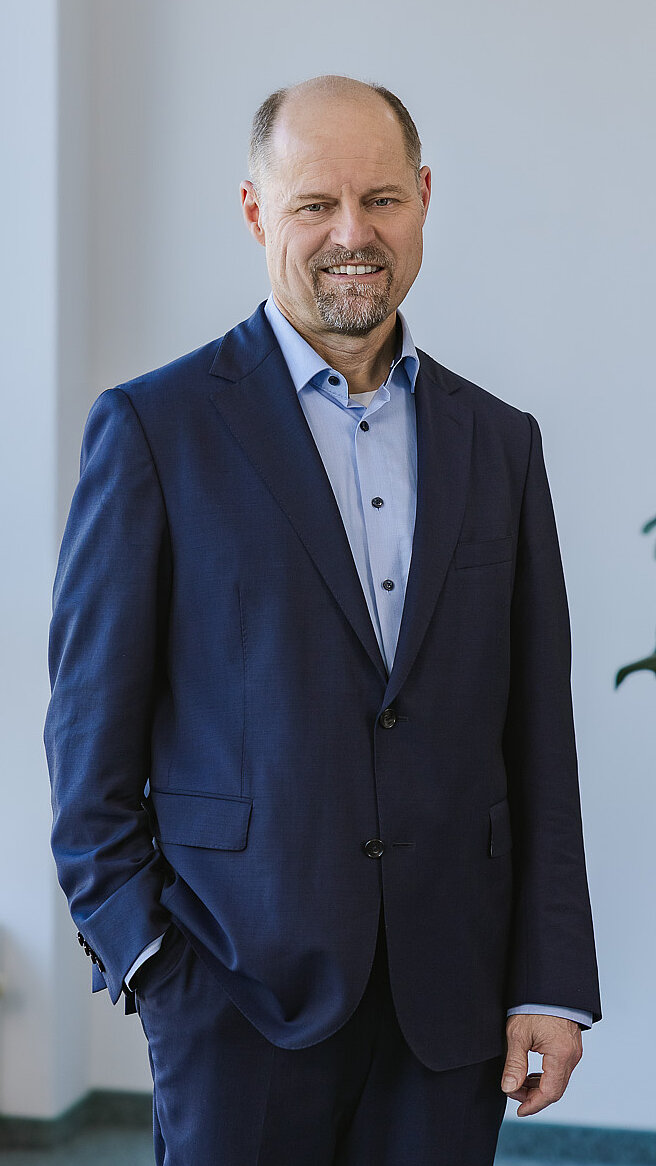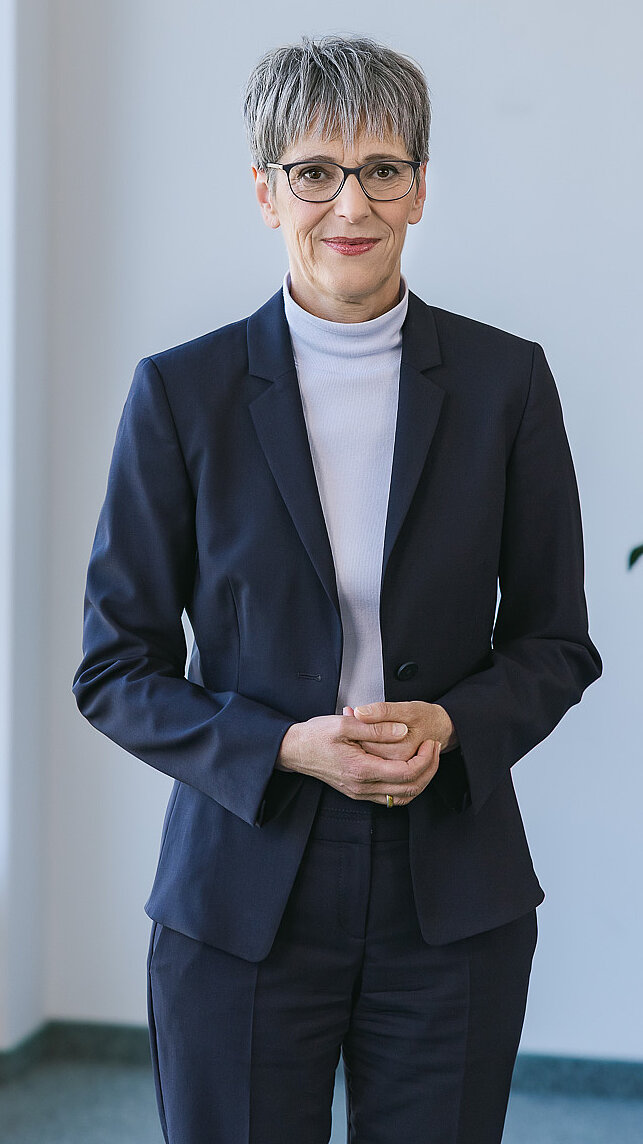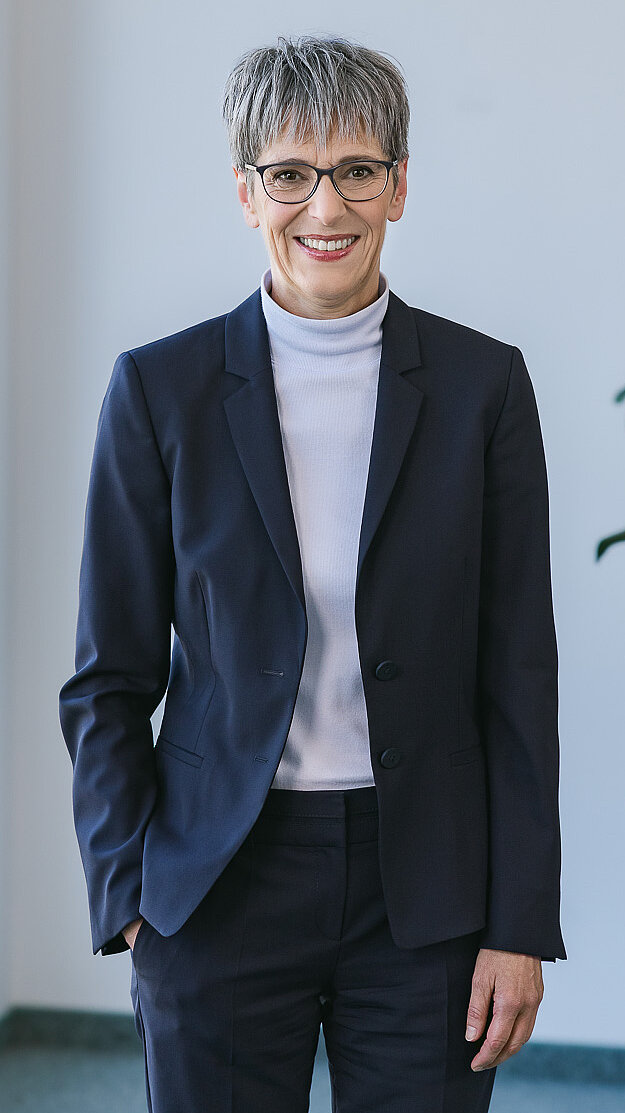Interview with the
Executive Board
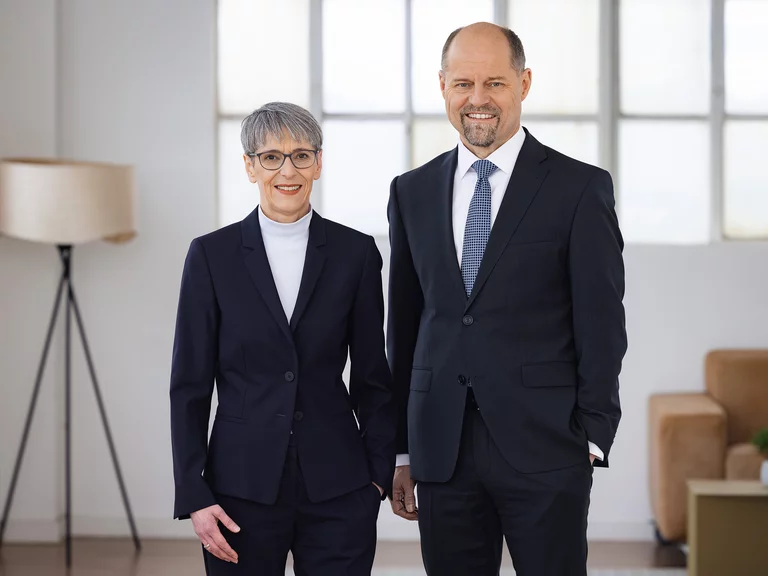
In the following interview, CEO Johannes Pfeffer and CFO Andrea Holzbaur comment on the challenges of the past financial year 2024, discuss key developments and provide an outlook on the path GESCO has taken to the planned targets in the current year and beyond.
Johannes, you’ve now completed your first six months at GESCO. How do you look back on it?
Johannes Pfeffer: Very positive – I had a really exciting start at GESCO. During the first six weeks of my term of office, I visited all the subsidiaries, where I took time to get to know and understand the people and the business. Although this was very time-consuming, it was more than worth it. Everywhere I went, I immediately realised that the employees are proud of their work and their company, and that they put their heart and soul into work. That’s the German Mittelstand!
And if you had to describe it in one word, what would it be?
Johannes Pfeffer: I was particularly impressed by the will to improve and change that I sensed everywhere, and even the passion that I could see in the management and staff of our subsidiaries. The despondency or lack of innovation in our economy that is currently being reported in the media is something I really haven’t seen anywhere. But I could also see a lot of potential for optimisation everywhere. I can’t do it justice in one word, so I’ll use two: passion and potential.
Are there things that have particularly stuck with you?
Johannes Pfeffer: Yes. I was very impressed by the pragmatism of our companies, which always manage to find unconventional and innovative answers and solutions and bring them to market. We can build on this strength in the future. However, we can and must communicate this strength much more effectively to the outside world and translate it into sales. ‘‘Do good and talk about it!’’ Our subsidiaries make great products, but many potential customers are still unaware of this. We need to take a closer look at which markets we want to and can address with which products and how exactly we can do this. Incidentally, this is precisely the core and focus of the new strategy process that we are carrying out for all companies in the second quarter – both as a strategic plan and in the development of its concrete implementation. This is precisely where I and the holding company team want to provide our subsidiaries with even greater support and guidance.
And how are things going with the managing directors and the teams?
Johannes Pfeffer: After two adjustments that I wanted to make early on, the team of managing directors is now in place. Together with the Holding Executive Board and directors they form what is known as the SLT, the Senior Leadership Team of our Group. We all meet very regularly to define standardised methods, processes, tools and best practices. It is fantastic for me to see how the creativity and openness in the SLT increases from time to time and how results are developed and realised that sometimes far exceed my expectations. Something really good is growing together!
Johannes, leadership seems to be close to your heart. What would you like to give to managers in terms of personnel management, and what do you expect from them?
Johannes Pfeffer: Just do it!
What do you mean exactly?
Johannes Pfeffer: The fact is that the vast majority of managers know quite well what good leadership is. Of course, leadership can always be further educated and trained, but I believe the opportunity lies in making it clear to all managers that they really can do it, that they really are allowed to do it and also that they really should do it, that this is our most important expectation of them. Making mistakes in day-to-day management is not the problem. Not leading, on the other hand, is not an option!
What challenges are the subsidiaries currently facing?
Johannes Pfeffer: The challenges are indeed complex. One of the biggest issues is the talent shortage. Medium-sized companies often struggle to attract and retain qualified specialists. Demographic change is making itself felt. More and more skilled workers are retiring, and not enough young talent is coming along. Another issue is the still very volatile material prices. However, the biggest short and medium-term challenge is still the noticeable reluctance to invest throughout the industry, which is ultimately due to national and geopolitical uncertainties.
Andrea, how do you see the general financial situation of GESCO Group in view of the still noticeable reluctance to invest?
Andrea Holzbaur: We are still in a rock-solid position. As Johannes has already mentioned, our subsidiaries have passion, potential and innovative strength.
And we are also financially capable of handling growth and innovation. Our balance sheet remains strong. Despite the poor result in 2024, we were able to strengthen the balance sheet again. We have reduced working capital and debt. We now have a net debt excluding leasing of just 0.7 times EBITDA. Last year it was still 0.9. We were also able to increase the equity ratio again to 62 %, despite a share buyback programme of € 9 million. Every bank is happy to finance us.
And how will GESCO support the companies in concrete terms?
Johannes Pfeffer: We have already launched a number of initiatives to actively support our subsidiaries. At the centre of these initiatives is the pursuit of speed, the acceleration of product development cycles and the reduction of lead times between order receipt and delivery. If we are fast and agile, we are much less dependent on fluctuations in material prices, can reduce our working capital and – most importantly – can differentiate ourselves from our competitors. The world belongs to the fast! How do we do this? By investing significantly in training programmes relating to lean management approaches, and even more so by specifically promoting and establishing a lean culture in each of our companies. We will also provide targeted expertise and manpower from the holding company.
Andrea Holzbaur: I know and appreciate the lean concept. It’s actually quite simple, even in the administrative area. A consistent focus on processes reduces waste. That saves time and money. Over the last two years, we have therefore simplified processes and introduced new systems, particularly in the holding company. This means that we can now support companies more quickly, e. g. with reporting.
Let’s talk about the GESCO Business System (GBS). What’s behind it?
Johannes Pfeffer: A wise mentor once gave me a sentence to help me on my career path: “Method enforces success!” The GBS is designed to make this formula for success a reality for GESCO.
We are making good progress with the definition and implementation of the GESCO Business System, even better than I could have hoped when I started my job. The GBS is more than just a management tool; it will become the centrepiece of our corporate culture and our sustainable growth. I want it to address all meaningful aspects of good corporate management, to provide simple and sensible structures for all subsidiaries, to ensure a consistent focus on efficiency and quality and – last but not least – to enable us as GESCO to manage inorganic growth on a larger scale.
“The GBS is more than just a management tool; it will become the centrepiece of our corporate culture and our sustainable growth.”
Johannes Pfeffer
CEO
The GBS addresses 4 pillars: General Management, Lean Management, Growth and Financial Management. Each of these pillars provides a basic set of jointly defined business processes and methods that are used and applied by all companies. None of these methods and modules are new or excessive; they have all been developed by SMEs for SMEs.
Examples include the processes of effective KPI management, the standardisation of our strategic planning processes, the use of established lean tools and processes relating to financial reporting and forecasting. In the first wave, which we will introduce in 2025, we are talking about around 20 such modules.
That sounds like a lot of effort. What is the real outcome, including financially?
Andrea Holzbaur: We are also following the lean concept here. This will not be a sprawling set of rules or a paper tiger. We will develop and introduce the modules together with the subsidiaries. So, it will be practice-orientated, lean and fast. And I can only agree with Johannes: “What gets measured gets done.” In this respect, KPI management will force success.
The GBS and the lean concept promote lean processes, the avoidance of waste and speed. This has a direct impact on earnings and the balance sheet: better margins, low overheads, low working capital and ultimately high cash flow. We embed this in all employees through our lean culture. We reach people in all areas via the operational route. This is more understandable and therefore more sustainable than Finance preaching that inventories must be reduced.
Apart from the GBS, what are your most important priorities for the coming years?
Johannes Pfeffer: At the top of the list for me is promoting and enabling the organic development of our portfolio companies. We want to ensure that their businesses can grow sustainably. The interplay between product management, innovation management and go-to-market processes is essential here. The former must answer the question of which product portfolio a company should invest its creative resources in, the latter translates the identified priorities into best-in-class products and the latter brings these to the target markets and customers in a timely manner.
Of course, we are also pursuing an inorganic growth strategy. This means that we are specifically looking for acquisitions that not only increase our market share but also support our organic growth strategies. We see acquisitions as a means of expanding existing strengths and tapping into new markets. And there is a lot of ‘‘music in it’’ at the moment – we are seeing a significant increase in attractive acquisition opportunities with rather moderate price tags on each target. But one thing is also clear: GESCO will not make an acquisition just because the target company is cheap. Quality before quantity remains the maxim under my leadership.
Another important priority is – I can almost say was – portfolio streamlining. We must ensure that we concentrate on the most profitable business areas. This may mean that we have to part with less profitable companies and parts of companies. In doing so, we always seek the best solutions in the interests of the employees and the company. I am very pleased that we were able to report two important milestones here in December 2024: the sale of the Foundry and Steelworks divisions at Doerrenberg and the management buy-out at AstroPlast. We have therefore started the 2025 financial year with a more focused and more profitable company portfolio.

Andrea Holzbaur: The sale of the Foundry and Steelworks divisions was the right strategic move. In the last financial year, the two divisions really struggled with the economic situation. The divisions have always been more or less loss-making, barely breaking even in good times. This year, due to the enormous drop in sales, the operating result was € −4.2 million. Added to this are the negative one-off effects from the sale of € −4.8 million. The overall impact on earnings of the two business segments is therefore a loss of 9 million.
Despite the one-off effect, it is the right step into the future financially. The one-off effect only has an impact on liquidity of € 2.2 million. However, it will strengthen our result and margin in the long term. Also important and difficult to measure directly: Doerrenberg can now fully focus its energy and attention on its core areas. What I am particularly pleased about, however, is that we have found a good buyer in Callista Private Equity GmbH. Callista has the necessary expertise for the turnaround. And not just expertise, Callista can also demonstrate the positive implementation of a turnaround, even in this sector. This gives us the best chance of securing the 127 jobs affected. We also have a responsibility towards the employees and their families.
How do you rate the sale of AstroPlast?
Andrea Holzbaur: The sale is positive all round. From a financial perspective, we are significantly improving our key figures. AP had a relatively high level of debt and low margins. Due to the difficult earnings situation and future prospects, we already had an impairment loss in 2023. This means that we had no additional burden from the deconsolidation this year.
Johannes Pfeffer: The sale, or management buyout, of AstroPlast was a strategic decision. The company, which has around 70 employees and sales of around € 15 million, specialises in the production of complex large plastic parts and has repeatedly been able to hold its own in a highly competitive market. Nevertheless, it is a contract manufacturing business model that is based on high investments with little potential for differentiation. The separation from AstroPlast was therefore carried out in order to shift our portfolio even further in the direction of innovation, uniqueness and value creation. The MBO was a win-win situation. GESCO can focus more on companies that offer higher added value, while AstroPlast is given the freedom to grow independently and implement its strategy in a more flexible environment. And the advantage of MBOs is simply that the transaction goes very smoothly, and the employees involved can continue to work under familiar management.
Now there have been two sales. When does GESCO want to grow again?
Andrea Holzbaur: The funnel of potential investments is well filled. We are looking at a lot and would also like to buy again quickly. That’s why we’re going to strengthen our team again in the second quarter. However, we are not setting up a dedicated M&A department. We are integrating the M&A process into the team of Business Directors, a staff unit and Finance. This will allow us to be more agile and flexible in the holding company as required. You can make plans for acquisitions, but you can’t seriously plan for them. The new structure gives us the flexibility we need to be able to do more or to respond quickly when necessary.
Johannes Pfeffer: However, we are confident that we will make a basic investment and an add-on acquisition this year.
What is your conclusion for the 2024 financial year?
Andrea Holzbaur: We ended the financial year with a very low result. Of course, we would have liked it to be different. The effects from the Foundry and Steelworks had a negative impact of € 9 million on the result. If you look at the Group without Doerrenberg, we were able to achieve EBIT of around 5.5 %. This is certainly not satisfactory. But it is still solid given the general conditions.
“The funnel of potential investments is well filled. We are looking at a lot and would like to buy again quickly.”
Andrea Holzbaur
CFO
I regard the share buyback as a success. We did this for the first time at GESCO. This is a change of strategy for us in terms of capital allocation. We are also keeping this option open for the future. The two sales in December were also important for the future.
Johannes Pfeffer: Let’s call it what it was: 2024 was difficult and, measured against our own standards, not successful. But we were still able to make a virtue out of necessity and did our homework: we reduced structural costs, streamlined our portfolio, bought back shares, strengthened customer loyalty and tackled fundamental issues. But that’s enough about last year. Now let’s look ahead: Based on our current estimates, the economy will not be providing us with much of a tailwind in 2025 either – but thanks to our good preparatory work, we can contribute a great deal to our own success. My prediction: 2025 will not be a phenomenal year, but it will be a good year. We will be able to increase our sales considerably and, in particular, achieve a pleasing result at the bottom line. I am very confident about that.

